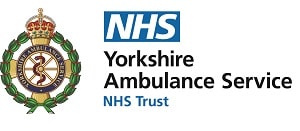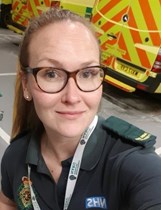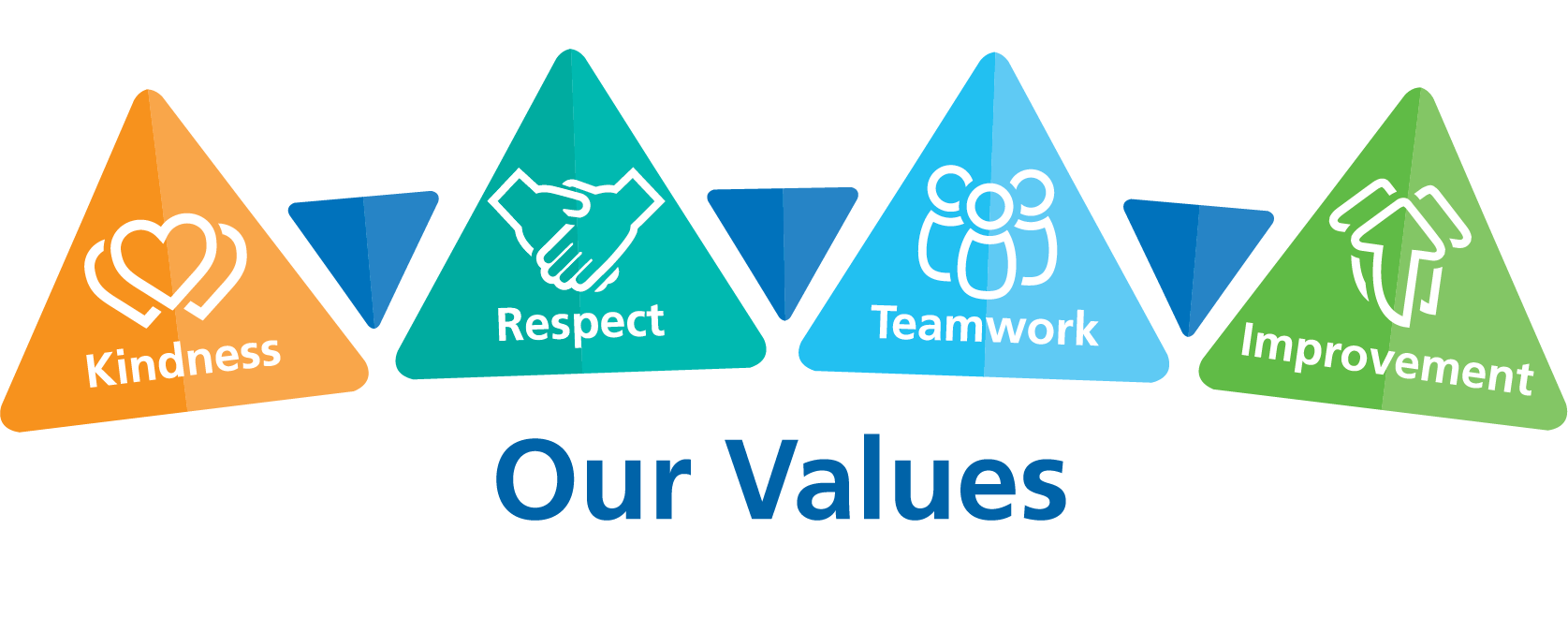Celebrating International Paramedics Day 2023
07 July 2023
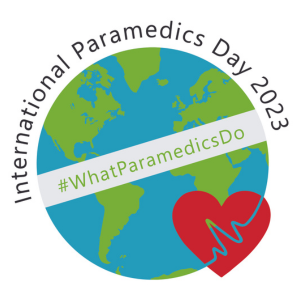
Saturday 8 July is International Paramedics Day which aims to build a better understanding of the breadth and depth of work carried out by Paramedics.
The event has been created, organised and run by the College of Paramedics in the UK, with support from professional paramedics' organisations from around the world.
The theme for International Paramedics’ Day 2023 is What Paramedics Do which aims to showcase the diversity of roles and settings that Paramedics work in so that we can improve awareness and understanding of the profession.
To mark the day, many of our Paramedics have shared their #WhatParamedicsDo stories, from those in traditional frontline roles to those who specialise in everything from research and critical care to urgent care and management.
How would you describe your role and the setting you work in?
I currently work in a specialised role within Yorkshire Ambulance Service which deals mainly with critically unwell patients due to a medical emergency or injury. The setting is varied and often unpredictable. Working ‘on the road’ can be emotionally charged, chaotic and time-critical, making it incredibly challenging. Due to the complexity of my role, part of my day also involves continuous education, training and reflection to ensure that the service we provide is safe and meeting the set standards of care. As part of my role, I sometimes work behind a desk to help determine the seriousness of a patient’s condition and assess the suitability for a specialised resource to attend. When on the desk, I also provide clinical support and advice to other colleagues faced with complex clinical cases.
What do you love most about your job?
I do love the camaraderie. We are considered a small team but we are privileged to have an inspirational leadership team that are incredibly supportive. As cheesy as it sounds, I also love when we, as a service, make a difference to the course of a patient’s health care. I also enjoy the unpredictability of the job, no two days are exactly the same.
What do you think people would find surprising or unexpected about the work you do?
As the role I currently work in is still fairly new, people and even some colleagues are surprised by the level of care that the specialist team I work within are able to provide as Paramedics. Some of the medications we carry are considered very strong and some of the procedures we are trained to perform are incredibly complex and high-risk that many often believe only doctors would be able to perform them. In terms of the wider context, people are also surprised by the breadth of care we, as an ambulance service, provide to our service users. We do commonly get the “I didn’t know you guys could do that!” comment from patients or their loved ones. Even with the increase in televised reality programmes that focus on pre-hospital care, some people are also still surprised that a portion of calls we receive do not require any interventions or treatments.
What advice would you give someone wanting to enter the profession?
It isn’t an easy profession. Mental and physical fatigue will catch you sooner than you expect, especially if you don’t practice good mental health and you don’t have a good support system. Some days at work will be difficult, but time and time again there will always be a patient that you meet that will make all the difficult days worthwhile.
Alex Diffley - Research Paramedic
How would you describe your role and the setting you work in?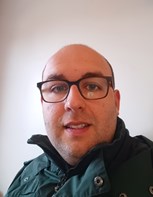
I am a Research Paramedic, largely responsible for research delivery. This involves managing and conducting ongoing clinical trials that Yorkshire Ambulance Service has agreed to be involved with, usually sponsored by a university. Each trial is different but generally I screen data from the electronic Patient Record, Computer Aided Dispatch (the software used to assess ambulance calls and dispatch resources) or trial specific apps - my clinical knowledge and history working on an ambulance helps with this. Then I upload relevant information to trial-specific databases, in some cases I contact participants for various reasons such as gaining informed consent for involvement. For some larger interventional trials, I am involved in teaching other Paramedics on recruitment processes. I also assist our Research and Development Manager with governance processes surrounding trial set-up.
What do you love most about your job?
I am a bit of a data geek, so I love compiling large amounts of data to evidence something with statistics instead of making presumptive statements, especially in this world full of fake news. My role also gives me the opportunity to conduct my own research where I grow in expertise in ecological sustainability relating to the ambulance sector.
What do you think people would find surprising or unexpected about the work you do?
What makes an ambulance service different to a hospital trust is we are so spread out over many locations – Yorkshire Ambulance Service has 62 stations. When organising clinical trials, we have to consider the logistics around delivering trial packs, training and audits. We are only a small team so this can be quite an arduous task.
What advice would you give someone wanting to enter the profession?
There is so much more to being a Paramedic than working on an ambulance responding to 999 calls. My role as a Research Paramedic assists in building the evidence base for future practice. If you want to be involved in research, I’d start by getting into the habit of seeing what pre-hospital research is going on. Read protocols and journal articles, nowadays you can even check out podcasts like Resus Room, maybe attend the 999EMS research forum and start networking with the growing community of pre-hospital researchers.
Ben Burnley - Paramedic/Major Trauma Clinical Triage Co-ordinator
How would you describe your role and the setting you work in?
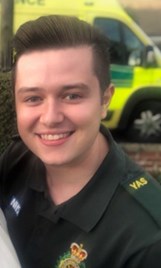
I am responsible for the co-ordination of a clinically focused response to potential major trauma incidents, major trauma triage and the effective utilisation of the regional major trauma pathway across each of the regional major trauma networks. I also play a fundamental role in the collation of data relating to the trauma pathway and in the follow-up of patients triggering the Injury Assessment Tool.
What do you love most about your job?
What I love most about my job are my working relationships with colleagues, peers, specialist teams (Specialist and Advanced Paramedics in Critical Care, British Association for Immediate Care Scheme Doctors, West Yorkshire Medic Response Team, Hazardous Area Response Team and Yorkshire Air Ambulance) and managers across all directorates and divisions within the Trust #OneTeam.
What do you think people would find surprising or unexpected about the work you do?
As well as playing a central role in co-ordinating the Trust’s response to major trauma across the region, I also provide the initial management of serious incidents that may present a significant risk to responding clinical staff, such as hazardous substance incidents and High Consequence Infectious Diseases, and co-ordinate any specialist response to these incidents.
What advice would you give someone wanting to enter the profession?
The advice I would give to someone wanting to enter the profession is do your research and carry out hands-on work or voluntary experience in a medical or health-related field. Being a Paramedic comes with a lot of responsibility, but it’s also an incredibly rewarding profession.
Leah Howard - Hazardous Area Response Team Paramedic
How would you describe your role and the setting you work in?
As a Hazardous Area Response Team Paramedic my role is to bring paramedic and advanced clinical care to patients in difficult-to-reach places and hazardous environments.
What do you love most about your job?
I love the challenge of combining my clinical practice with the technical capabilities of a HART Paramedic. It requires continuous training which I enjoy and I’m lucky enough to be prescribed within my role.
What do you think people would find surprising or unexpected about the work you do?
I think people would be surprised to learn that on normal shift I carry 10 different sets of uniform and PPE. Most often people are surprised to learn how many technical capabilities a HART Paramedic is trained in such as water rescue, rescue at heights, infectious disease transfers, CBRN and hazardous material incidents and marauding terrorism responses.What advice would you give someone wanting to enter the profession?
Never stop learning and never be afraid to ask questions. This job can humble you very quickly if you become complacent. Do not be afraid to admit when you’re not sure and seek help. We have all been there and no matter if you’re year one or year 20 in your career you can always learn something or be presented with a scenario you have no idea about.Tom Carrivick - Paramedic/Senior Clinical Advisor
How would you describe your role and the setting you work in?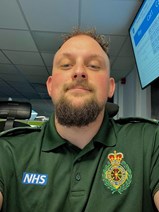
My role is diverse, interesting but most of all rewarding. I work as a Senior Clinical Advisor in the Clinical Hub in York Emergency Operations Centre. The main aspects of my role include remote triage of patients who have called 999. Mostly the triage is completed remotely via telephone. However, where appropriate we can use video triage to aid in our decision-making and assessment. One of the other aspects of our role is to provide senior clinical support to colleagues on the road, mainly with clinical advice or discussions surrounding safe patient discharge on scene. I have been doing this role for 10 months after coming from A&E Operations as a frontline Paramedic. The role can be fast paced and constantly keeps you thinking. I work within a team of clinicians and the environment in the Clinical Hub is supportive and welcoming, it is a really pleasant place to work within the Trust.
What do you love most about your job?
The main aspect of the job I enjoy is speaking to a diverse array of patients and ensuring they are getting the right, most appropriate response from the ambulance service at their time of calling. This is sometimes reflected in the appropriate upgrading of their incident but often involves assessment and referral onto the many services and other healthcare providers we have access to as an alternative or more appropriate source of care other than a hospital A&E.
What do you think people would find surprising or unexpected about the work you do?
Probably how much clinical triage and remote assessment happens behind the scenes. When I worked on the road, I had no perception of how many calls were triaged and passed onto other healthcare providers and you do not get to see a true reflection of this until you are involved in it. It highlights just how important the role is in ensuring ambulances are used for the most appropriate jobs.
What advice would you give someone wanting to enter the profession?
I would advise them that remote triage is a brilliant skill to have as a Paramedic. It improves your knowledge as a clinician. Especially you’re history taking because as a remote triage Paramedic you no longer have use of your eyes for clues about a patient’s condition. I am soon to return to working on the road, starting a 50/50 rota, split between Clinical Hub and my base station of Bramley in Leeds. The two job roles are intertwined, work in harmony with each other and allow continuous development within the Paramedic field.
Steve Johnson - Paramedic/Primary Care Paramedic Rotation
How would you describe your role and the setting you work in?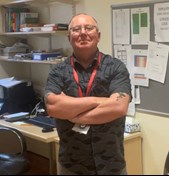
After a 12-week induction at the surgery I will rotate between primary care and the ambulance service on a six-weekly basis with the Park Surgery in Driffield and YAS. I’m part way through my induction which has comprised of various clinics and home visits with GPs and other healthcare professionals observing how patient care is delivered. It will also include supervision of my patient consultations and continuation training before eventually running my own clinics with support when needed.
What do you love most about your job?
I am enjoying the challenge and seeing how healthcare looks form a different perspective. Its also an excellent opportunity for sharing ideas and understanding problems faced by both services. It is a very busy surgery and I have been impressed by everybody who works there and have been made to feel very welcome.
What do you think people would find surprising or unexpected about the work you do?
I think most people would be surprised at how much we have to study and the many different clinical procedures we can carry out. People in general are also unaware of the different options we have in treating the patient on scene or referring to other departments/agencies not just taking them to hospital.
What advice would you give someone wanting to enter the profession?
If someone wanted to enter the profession, I would advise them to take on some voluntary work first in a caring capacity/voluntary first aid organisation etc to build confidence in communicating with people and gaining some 'life experience'.
Carl Betts - Paramedic/QI Lead
"I became a paramedic as a direct entry student at the age of 30 and since qualifying I've really enjoyed the experiences and my career as a paramedic. I've had the opportunity to diversify from being a 

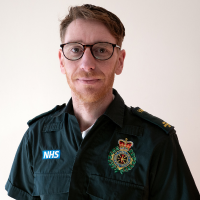
 paramedic into the Quality Improvement world, which I've thoroughly enjoyed, and I think that's one of the key factors of being a paramedic now - opportunities are open everywhere into multitudes of sectors. We're at the cusp of something really good in the paramedic world and I think this is the best time to join the profession. As a piece of advice from me, if you are thinking of becoming a paramedic, please look after yourself. We spend all of our working time looking after others but we sometimes forget to look after us."
paramedic into the Quality Improvement world, which I've thoroughly enjoyed, and I think that's one of the key factors of being a paramedic now - opportunities are open everywhere into multitudes of sectors. We're at the cusp of something really good in the paramedic world and I think this is the best time to join the profession. As a piece of advice from me, if you are thinking of becoming a paramedic, please look after yourself. We spend all of our working time looking after others but we sometimes forget to look after us."
Produced by: Corporate Communications Department
